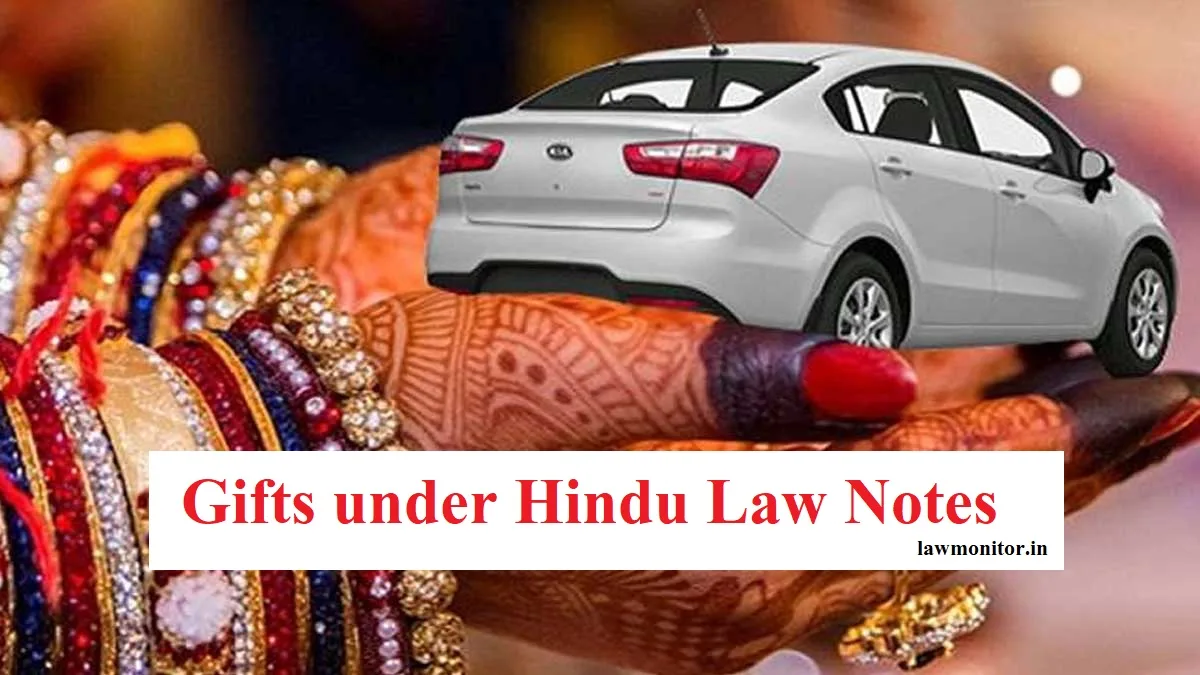Under Hindu Law, the concept of a gift holds significant legal importance. It goes beyond a simple act of generosity; it constitutes a legally binding transaction that embodies various values, responsibilities, and rights.
Gift under Hindu Law
A gift under Hindu Law is a voluntary transfer of property from one person to another without any consideration. The transfer is complete only when the recipient accepts the gift. According to the Mitakshara school, a gift involves renouncing property rights without expecting anything in return, and this transference is valid only upon the recipient’s acceptance.
Essentials of a Gift under Hindu Law
- Absence of Consideration: Gifts are made without expecting anything in return, distinguishing them from transactions involving compensation.
- Presence of a Donor: The donor is the person giving the gift. The donor must be of legal age and have the legal capacity to transfer the property.
- Presence of a Donee: The donee is the recipient of the gift. Minors can be donees, but if the gift imposes obligations, these cannot be enforced until the minor reaches adulthood. The donee can accept or reject the gift upon reaching the age of majority.
- Subject Matter of Gift: Gifts can include:
- Self-acquired property: Separate or self-acquired property, ensuring claims of dependents.
- Stridhana: A woman can gift her separate property.
- Widows’ rights: A widow can gift a portion of inherited assets.
- Parental authority: Parents can gift their property, subject to maintenance claims.
- Coparcenary interest: A coparcener can gift their interest with fellow coparceners’ consent.
- Impartible estate: Owners can gift or bequeath these unless restricted by traditions.
- Gift of Undivided Interest: Under Mitakshara law, co-owners cannot gift their entire stake in co-owned property without consent from other co-owners.
- Delivery of Possession: A gift is effective when it is executed, registered, and delivered into the donee’s possession. The donor must relinquish ownership, and the donee must accept the gift for it to be legally valid.
- Acceptance of Gifts: Acceptance is crucial for the validity of a gift. The Transfer of Property Act doesn’t specify an acceptance method, but actions and circumstances can indicate acceptance. Delivery of the gift document or taking possession of the property signifies acceptance.
Read Also: What is Maintenance Pendente Lite? Section 24 of the Hindu Marriage Act, 1955
Modes of Gift Acceptance in Hindu Law
- Mental Acceptance: The recipient mentally acknowledges and intends to accept the gift, signifying agreement without outward expression.
- Verbal Acceptance: The recipient verbally expresses their willingness to accept the gift, clearly indicating acceptance.
- Corporeal Acceptance: The recipient physically takes possession of the gifted property, demonstrating explicit acceptance and readiness to assume ownership.
Types of Property That Can Be Gifted in Hindu Law
Separate or Self-Acquired Property
A Hindu individual has the right to gift their separate or self-acquired property. However, if family members who are legally entitled to maintenance from the individual make a claim, the gift can be contested.
Coparcenary Interest (Dayabhaga School)
In the Dayabhaga School, a coparcener can gift their coparcenary interest, subject to the rights of family members entitled to maintenance.
Coparcenary Interest (Mitakshara School)
Under the Mitakshara School, a coparcener cannot gift their coparcenary interest unless they are the sole surviving coparcener in the family.
Father’s Right to Dispose of Property
According to Dayabhaga law, a father can gift all his property, but this is subject to the claims of family members entitled to maintenance.
Female Hindu’s Right to Dispose of Property
Under Section 14 of the Hindu Succession Act, 1956, a female Hindu can gift all her property. Historically, she could only gift her stridhana property.
Widow’s Right to Dispose of Property
A widow can gift a portion of her widow’s estate to her daughter or son-in-law, especially for her daughter’s marriage. This cannot be done through a will.
Gifts and the Transfer of Property Act
Gift of Immovable Property
To gift immovable property validly, the transfer must be formalized through a registered instrument signed by the donor and attested by at least two witnesses.
Gift of Movable Property
Gifting movable property can be done through a registered document signed by the donor or by physically delivering the property to the recipient.
Gifts to Unborn Persons
Traditional Hindu law prohibits gifts to individuals who do not exist at the time of the gift. However, in Bangladesh, customary Hindu practices and the Transfer of Property Act of 1882 may apply.
Additional Provisions
Reservation of Life Interest
A gift remains valid even if the donor reserves the right to enjoy the benefits or profits of the gifted property for their lifetime.
Conditions Restraining Alienation or Partition
Conditions that restrict the donee’s ability to alienate or partition the gifted property are void, but the gift itself remains valid.
Revocation of Gift
Generally, a gift in Hindu law cannot be revoked. However, it can be revoked in cases of fraud or undue influence. For instance, in Ganga Bakash vs. Jagat Bahadur, the court supported the principle that gifts made under undue influence could be revoked. Additionally, in Deo Kura vs. Man Kura, a gift made by a widow was scrutinized due to claims that she did not fully understand the gift document’s contents.




